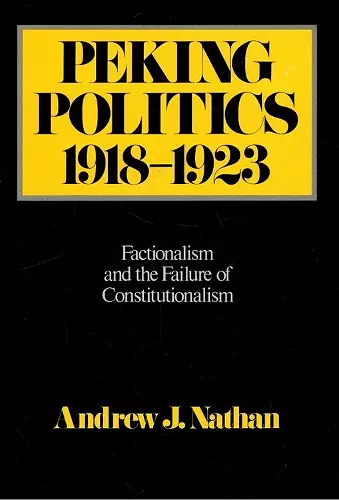Peking Politics, 1918–1923
Factionalism and the Failure of Constitutionalism
Format:Hardback
Publisher:The University of Michigan Press
Published:1st Jan '98
Currently unavailable, and unfortunately no date known when it will be back

On January 1, 1912, the world’s oldest, most populous empire bowed to the tide of history and became a republic. Since the American Revolution, one nation after another had adopted a constitution, often with remarkable regenerative results—Japan was the most impressive recent example. “The future of China is like building a railroad,” Sun Yat-sen pointed out. “Should we use the first locomotive ever invented or today’s improved and most efficient one?” Many Chinese expected a new China, with its up-to-date governmental machinery, to drive straight for national wealth and power. Sixteen years later the dream was rubble. The republic had shrunk to a fig-leaf marshal’s government run by Chang Tso-lin. Years of warlord devastation had ruined the agriculture and disrupted the trade of North China, and a major famine was imminent. The Kuomintang was poised to complete national reunification under its own auspices, bringing a merciful end to an experiment that had dragged on too long. What went wrong? Peking Politics attempts to contribute to an understanding of that question by examining the workings of the Peking political system, showing how the informal political rules of factionalism undermined the formal political system of constitutionalism. This is not an attempt to explain why, in terms of larger economic, social, or cultural variables, a stable republic could not survive in China. It is an investigation rather of how constitutionalism failed, of the political processes that occurred under the early republic, and of how they undermined the new institutions in which such great hopes were placed.
ISBN: 9780892641314
Dimensions: unknown
Weight: unknown
320 pages